We develop evidence based digital behaviour change interventions that use proven behavioural science that empower people to take control and improve their physical, emotional and mental health – their whole wellbeing.
We do this by connecting with what’s important to our users when they think about their future. By helping them identify changes in their lifestyle management, creating simple goals and planning their first steps to achieving them.
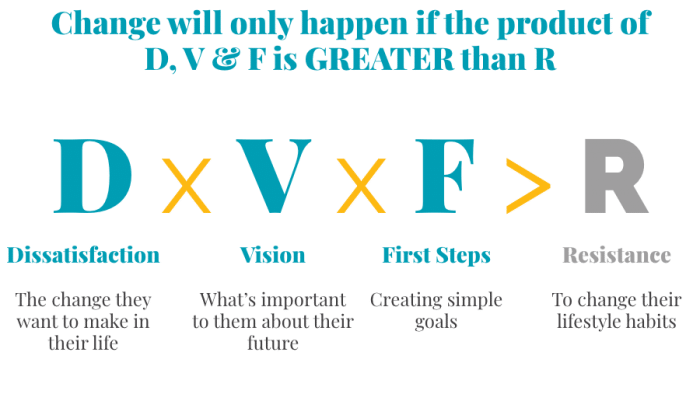
Timeline
2012
Co-Designing in response to insight of over 1,500 individuals – it was never a pre-conceived idea
2013
Born in June and originally named Puffell.com
2014
User base grows organically
2015
Refined through further insight and usability testing and officially launched
2017
Saw the launch of version 3 now named Best-You following further user insight
2019
Launch the Best-You Chat App
Our Partners
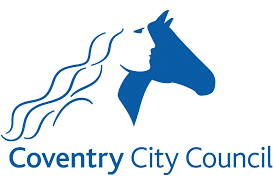

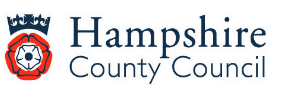

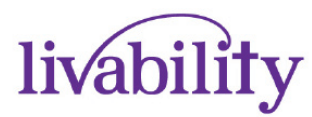








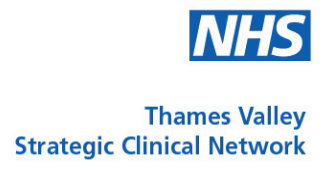
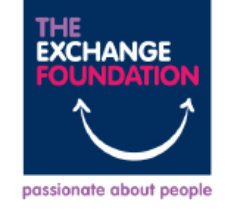
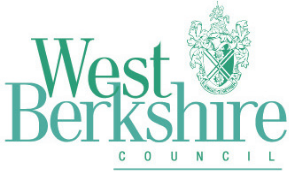
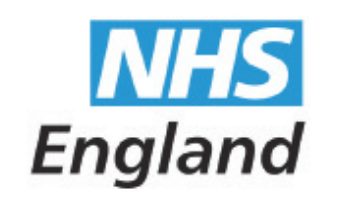
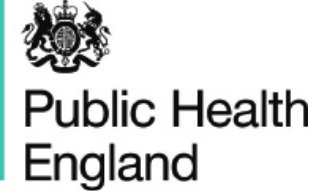
Best-You is a world first in digital holistic lifestyle management and includes long-term condition healthcare including
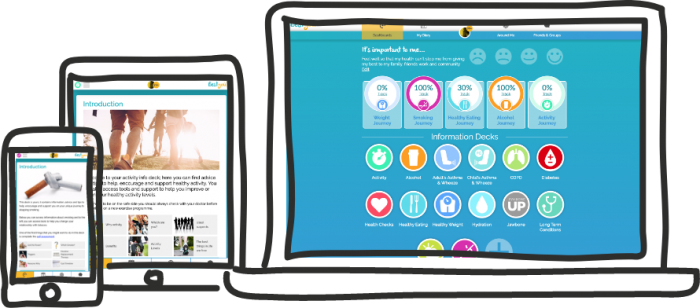
Lifestyle factors:
Activity
Healthy Eating
Weight Management
Alcohol
Smoking
Mental Health
Sleep
Hydration
Long term Condition Management integrated with Lifestyle factors:
Diabetes
COPD
Asthma
Camhs
Heart Age
How Best-You works
“The micro”
Best-You is a digital companion. Focused on the one person, YOU. We think of this as “the micro” perspective.
Human Factor design is central to the build logic for Best-You. The lifestyle management service is founded on the 5 ways to wellbeing.
It’s key to know how to design digitally for people, this is often called “Human Factor” the Best-You team are experts in this field. Co-created every step of the way by users for users. Our build logic is built on desirable, viable and feasible, and creates opportunities for every user to practice supported self-care via the 5 ways to wellbeing.
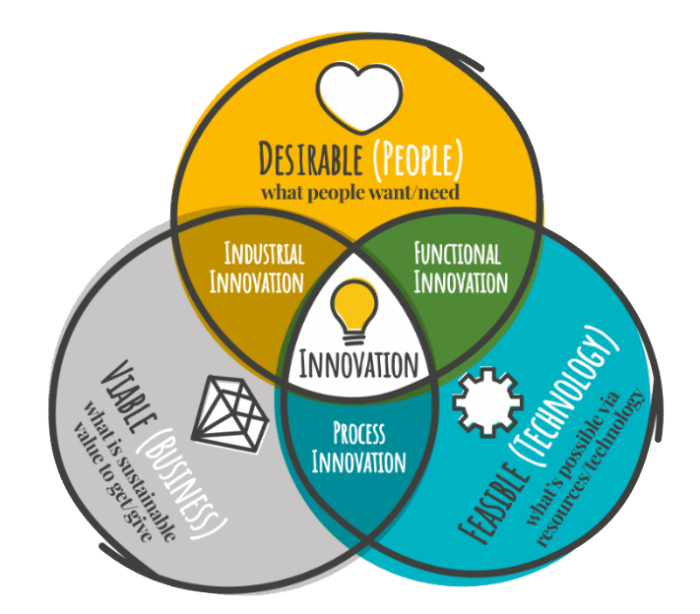
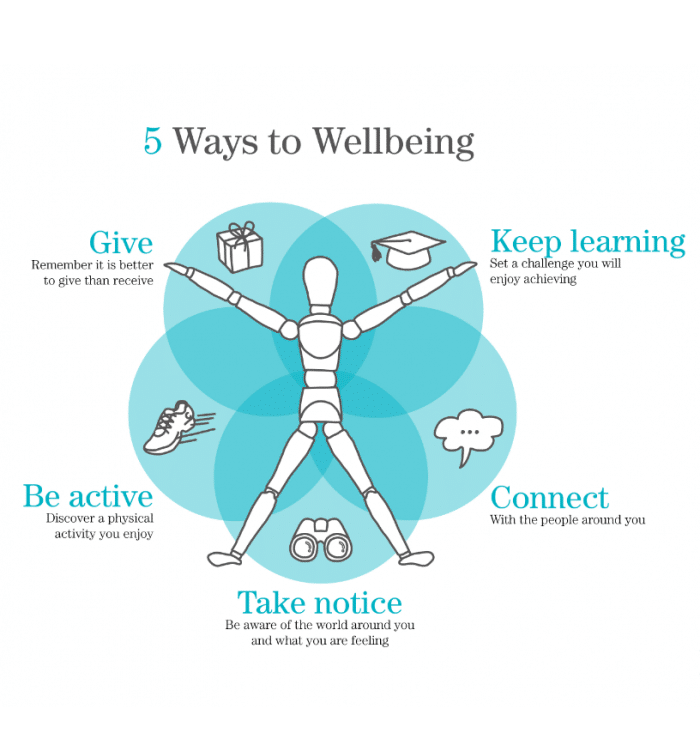
Dynamic Wellness Model
Each of us have capability, it’s our capacity to take on and achieve things. However, when you think about behaviour change, lifestyle management and illness, what are we measuring?
It’s capability that gets measured which is explained in the simple equation below
Capability = their Confidence to take action (multiplied by) their Competence in doing it
Confidence is measured by goal setting, people don’t set goals they are not confident they will achieve
Competence is measured by tracking, tracking demonstrates their level of competence
Capability = Confidence goal setting (multiplied by) Competence tracking behaviours
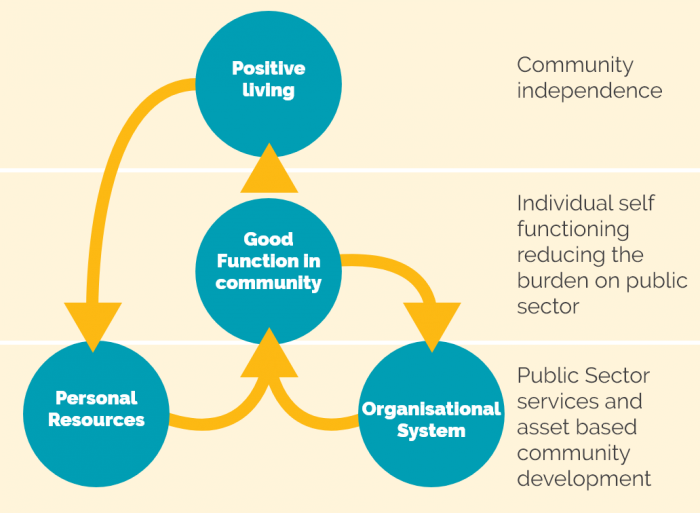
The behavioural science adopted is the dynamic wellness model (*NEF and Zheng and Walsham (2008), adopted from Robeyns (2005a)
The Dynamic Wellness model (left) explains how people move as they increase capability. Moving from fully supported by a service with high dependency, to journeys that promote increased self-care and higher functioning. The complex relationship that is required, creating a hybrid experience of digital, face to face support and increasing confidence and competence, means the person at the centre of the journey moves to need less “organisational system” service and uses more digital and increased self-care, building resilience and “good functioning”.
This increased capability reduces the reliance and use on the public sector (NHS, social care and public health & education) at the same time as increasing “positive living” experienced by the population. As the confidence increases (measured by higher levels of tracking success ie weight loss, activity time, being smoke free etc) the person moves from good functioning to positive living, having increased aspiration, opening up new concepts and ideas for living. It’s a virtuous circle. Increased aspiration and capability increases personal resources allowing your population to play their part effectively in society, further relieving the strain on the public system.
How Best-You works
“The macro” – at a community & system level
It’s clear from the work of our partners and the insight research that people don’t want silos, they want easy to navigate support. Behavioural science also confirms that clarity and simplicity is what the brain seeks and needs, we use mental short cuts, rule of thumb and other decision making tools to help us. Best–You, as the place based system tool at a PCN, ICP and ICS level, gives you a common front door. All in one place, offering easy to follow pathways to local services and voluntary sector, peer groups and tools for self-care.
Prof Deansfield, PHE & Best-You
Health Checks activation tool.
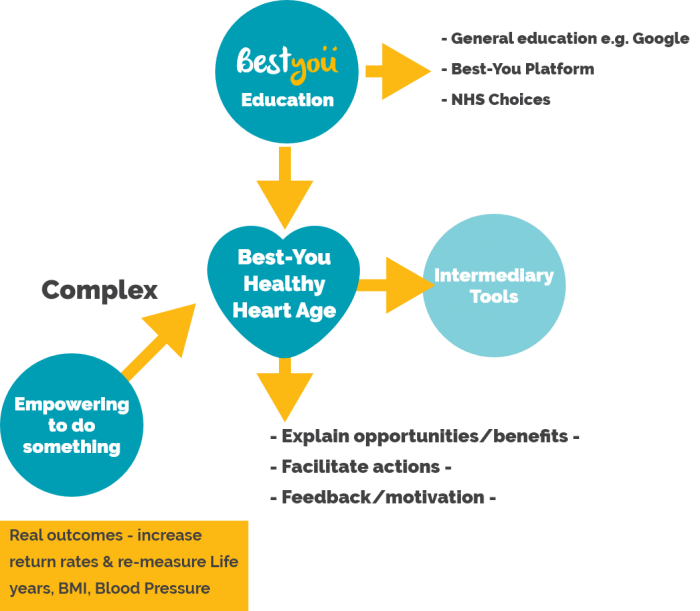
How creating social movements at the Macro population level enables prevention and illness management, ie health improvement.
- The population first identify a need or desire to change.
- Next, often informally, they will educate themselves looking at their social networks, friends and family, internet search engines and places like their GP’s surgery.
- Once educated they want to measure themselves against others, we have tools and campaign devices to accelerate adoption like the heart age tool. The heart age tool gives an estimated heart age and uses behavioural science to create engagement.
- It breaks down complexity and empowers people to take action.
- Best-You facilitates them to build capability by goal setting and increasing competence by tracking to show progress and increase confidence.
- Feedback is essential, feedback is the food for motivation and successful behaviour change.
The Best-You platform delivers this user experience at both a micro and macro level, giving you as commissioners the anonymous data about what and how your population are doing and when they are doing it, to locations at a postcode level ie CH63.
Features
Functions
People change behaviour on Best-You
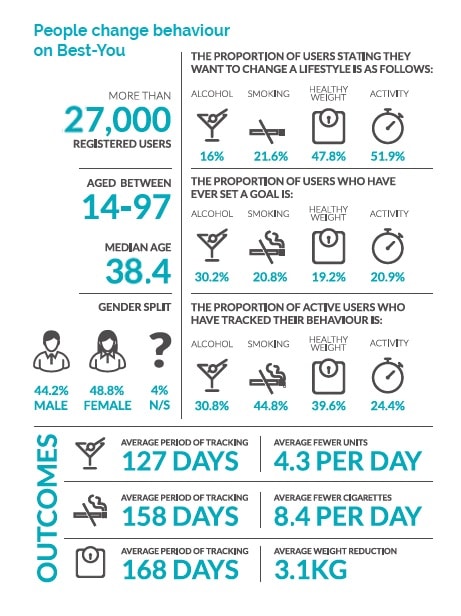
Best-You offers the opportunity to capture rich lifestyle and long-term conditions user data
Best-You is evidencing outcomes, including:
- Increased patient self-care
- Better population self-management for life style habits
- Reduced and redirected service demand
- Reduced health and social care costs- via prevention and better managed illness
Best-You provides both hard and soft data for
- Clinical measures that evidence that a patient and population has made positive progress
- People-centred outcome measures (PCOMs and PROMs)